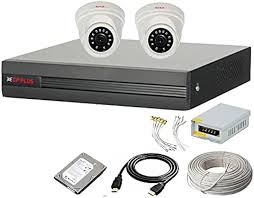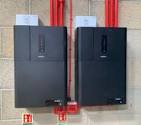An alarm panel is a crucial component of any security system, serving as the central hub that monitors and controls various sensors and detectors installed throughout a property. This electronic device plays a vital role in safeguarding homes, businesses, and other premises by alerting occupants and authorities to potential security breaches or emergencies.
Alarm panels are designed to receive signals from connected sensors, such as motion detectors, door/window contacts, glass break detectors, and smoke alarms. When a sensor is triggered by unauthorized entry, movement, or other suspicious activity, it sends a signal to the alarm panel, which then activates audible sirens or alerts and notifies the monitoring station or designated contacts.
Modern alarm panels offer advanced features and functionalities to enhance security and convenience. These may include touch-screen interfaces for easy operation, wireless connectivity for remote access and control via smartphones or tablets, integration with home automation systems for seamless monitoring of connected devices, and backup battery power to ensure uninterrupted operation during power outages.
Alarm panels come in various types and configurations to suit different security needs and preferences. Some systems are designed for residential use, offering basic intrusion detection capabilities along with optional features like fire detection and environmental monitoring. Commercial-grade alarm panels are typically more robust and scalable, capable of managing multiple zones, users, and access levels in large buildings or facilities.
Overall, an alarm panel is a critical component of any comprehensive security system that provides peace of mind knowing that your property is monitored and protected around the clock. By investing in a reliable alarm panel tailored to your specific requirements, you can deter intruders, respond swiftly to emergencies, and ensure the safety of occupants and assets.
5 Essential Tips for Maintaining and Optimizing Your Alarm Panel
- Always test your alarm panel regularly to ensure it is functioning properly.
- Keep the user manual handy for reference in case you need to troubleshoot any issues with the alarm panel.
- Make sure all entry points are secured and sensors are properly positioned for optimal coverage.
- Change your alarm code periodically and avoid sharing it with unauthorized individuals.
- In case of a false alarm, know how to quickly disarm the system to prevent unnecessary alerts.
Always test your alarm panel regularly to ensure it is functioning properly.
It is essential to always test your alarm panel regularly to ensure it is functioning properly. Regular testing helps identify any potential issues or malfunctions in the system, allowing you to address them promptly before they compromise the security of your property. By conducting routine tests, you can verify that all sensors, detectors, and communication channels are operational and that the alarm panel can effectively trigger alerts and notifications in case of an emergency. This proactive approach not only enhances the reliability of your security system but also provides peace of mind knowing that your property is adequately protected at all times.
Keep the user manual handy for reference in case you need to troubleshoot any issues with the alarm panel.
It is essential to keep the user manual of your alarm panel easily accessible for reference in case you encounter any issues that require troubleshooting. The user manual contains valuable information about the operation, maintenance, and troubleshooting of the alarm panel, including guidance on common problems and their solutions. By having the user manual handy, you can quickly identify and address any issues that may arise, ensuring that your security system remains functional and effective at all times.
Make sure all entry points are secured and sensors are properly positioned for optimal coverage.
To maximize the effectiveness of your alarm panel, it is essential to ensure that all entry points, such as doors and windows, are properly secured with sensors and detectors. Positioning these devices strategically throughout your property will help provide comprehensive coverage and early detection of any unauthorized entry or suspicious activity. By meticulously planning the placement of sensors and ensuring that they are functioning correctly, you can enhance the overall security of your premises and improve the responsiveness of your alarm system in case of an emergency.
Change your alarm code periodically and avoid sharing it with unauthorized individuals.
It is essential to change your alarm code periodically and refrain from sharing it with unauthorized individuals to enhance the security of your system. By regularly updating your alarm code, you reduce the risk of unauthorized access and potential breaches. Sharing your code only with trusted individuals helps maintain the integrity of your security measures and ensures that only authorized users can arm and disarm the system. Taking these simple precautions can significantly bolster the effectiveness of your alarm panel in safeguarding your property and providing peace of mind.
In case of a false alarm, know how to quickly disarm the system to prevent unnecessary alerts.
It is essential to be prepared for false alarms and know how to swiftly disarm the alarm panel to avoid unnecessary alerts. In the event of a false alarm triggered by accidental movements or disturbances, being able to quickly deactivate the system can help prevent unnecessary panic and disruptions. Familiarizing yourself with the disarm process and having clear instructions in place can ensure a prompt response to false alarms, minimizing inconvenience and maintaining the effectiveness of the security system.



